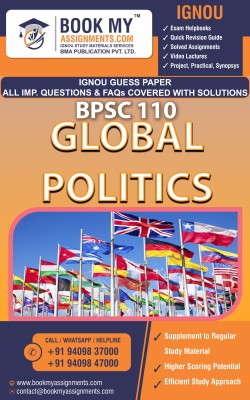IGNOU BPSC 110 Global Politics | Guess Paper | Important Question Answer |BACHELOR'S (HONOURS) DEGREE PROGRAMMES(Paperback, BMA Publication)
Quick Overview
Product Price Comparison
Introduction to Global Politics: The course would likely begin with an overview of global politics as a field of study, exploring its scope, theoretical foundations, and relevance to contemporary global challenges.Theoretical Perspectives in Global Politics: Students would delve into major theoretical perspectives in global politics, such as realism, liberalism, constructivism, Marxism, feminism, and post-colonialism. They would examine how these theories explain and interpret patterns of state behavior, international cooperation, conflict, and globalization.The Global Political Economy: Students would explore the intersection of politics and economics in global politics, including theories of globalization, economic development, trade, finance, and inequality. This could involve studying the role of international financial institutions, multinational corporations, and global trade agreements.International Security and Conflict: The course may cover theories and practices related to international security, including traditional and non-traditional security threats. Students would examine topics such as nuclear proliferation, terrorism, cyber warfare, humanitarian intervention, and peacebuilding efforts.Global Governance and International Organizations: Students would explore the role of international organizations and regimes in managing global issues such as climate change, human rights, migration, and health pandemics. This could involve studying organizations such as the United Nations, the World Bank, the International Monetary Fund, and regional bodies like the European Union.Transnational Actors and Movements: Students might examine the role of non-state actors and transnational movements in global politics, including civil society organizations, social movements, and transnational advocacy networks. This could involve studying their influence on policy-making, human rights advocacy, and global governance.Global Environmental Politics: The course may cover debates and challenges in global environmental politics, including climate change, biodiversity loss, deforestation, and pollution. Students would explore international efforts to address environmental issues through treaties, agreements, and sustainable development initiatives.Globalization and Cultural Politics: Students would likely explore the cultural dimensions of globalization and its impact on identity, nationalism, and cultural diversity. This could involve studying cultural imperialism, cultural diplomacy, and resistance to globalization.Human Rights and Global Justice: The course may cover debates about human rights, global justice, and humanitarian intervention in global politics. Students would examine issues such as the responsibility to protect (R2P), refugee rights, and the tension between state sovereignty and international norms.Global Health Politics: Students might explore the intersection of politics and public health in global politics, including challenges such as infectious diseases, access to healthcare, and pandemic preparedness. This could involve studying global health governance structures, international health regulations, and responses to health emergencies.


